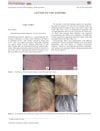 February 2023 in “Medical Clinical Update”
February 2023 in “Medical Clinical Update” Some people with alopecia areata, a hair loss condition, get better within a year without treatment, but it can happen again.
 5 citations,
October 2013 in “Veterinary Clinics of North America: Equine Practice”
5 citations,
October 2013 in “Veterinary Clinics of North America: Equine Practice” Some horses lose hair without inflammation or itching due to various conditions, and while mainly a cosmetic issue, diagnosis requires examination and biopsies, and breeding is not advised if it's hereditary.

Some drugs can reduce male semen quality.
 12 citations,
December 2021 in “Frontiers in Medicine”
12 citations,
December 2021 in “Frontiers in Medicine” Some patients on immunosuppressants had a weaker immune response to the Sinovac-CoronaVac COVID-19 vaccine.
 2 citations,
July 2018 in “Elsevier eBooks”
2 citations,
July 2018 in “Elsevier eBooks” Some supplements may help with hair loss, but there's not enough strong evidence to recommend them without doctor advice.
 November 2021 in “Open Forum Infectious Diseases”
November 2021 in “Open Forum Infectious Diseases” Some COVID-19 pneumonia patients in Veracruz, Mexico had rare skin issues like temporary hair loss linked to disease severity.
 September 2017 in “Plastic and Reconstructive Surgery – Global Open”
September 2017 in “Plastic and Reconstructive Surgery – Global Open” Some migraine sufferers had no more headaches after getting a hair transplant.
 11 citations,
May 2009 in “Actas Dermo-Sifiliográficas”
11 citations,
May 2009 in “Actas Dermo-Sifiliográficas” Some treatments can help hair regrowth in alopecia areata, but none offer a cure, and effectiveness varies.
 September 2023 in “Baylor University Medical Center Proceedings”
September 2023 in “Baylor University Medical Center Proceedings” Some alternative supplements might help with hair loss due to androgenetic alopecia.
 31 citations,
January 2016 in “Drugs - Real World Outcomes”
31 citations,
January 2016 in “Drugs - Real World Outcomes” Some new oral anticoagulants may also cause hair loss and might not be better than traditional ones for preventing hair loss.
 1 citations,
July 2023 in “Cureus”
1 citations,
July 2023 in “Cureus” Some treatments for hereditary hair loss are effective but vary in results and side effects; new therapies show promise but need more research.
 5 citations,
August 2018 in “European Psychiatry”
5 citations,
August 2018 in “European Psychiatry” Some psychiatric drugs can cause severe hair loss, especially valproic acid, and it's more likely in women or those with thyroid issues or past hair loss.
1 citations,
June 2017 in “The journal of investigative dermatology/Journal of investigative dermatology” The symposium highlighted the skin's role in sensing itch, pain, touch, and pleasure, and discussed new research and techniques for understanding and treating these sensations.
18 citations,
November 2016 in “Transgenic research” Overexpressing Tβ4 in cashmere goats improves hair fiber traits and increases cashmere yield.
 2 citations,
May 2018 in “Australasian Journal of Dermatology”
2 citations,
May 2018 in “Australasian Journal of Dermatology” Some patients' hair grew back black and white after chemotherapy.
 69 citations,
December 2011 in “Journal of Ethnopharmacology”
69 citations,
December 2011 in “Journal of Ethnopharmacology” Some Thai plants, especially Carthamus tinctorius, could help prevent hair loss and promote hair growth without adverse effects.
 13 citations,
January 2021 in “Regenerative Medicine”
13 citations,
January 2021 in “Regenerative Medicine” Platelet lysate could be a valuable treatment for many diseases in regenerative medicine.
 December 2020 in “Dermatology archives”
December 2020 in “Dermatology archives” Some COVID-19 pneumonia patients in Veracruz, Mexico, had skin issues, with reversible hair loss linked to disease severity.
 18 citations,
October 2020 in “Radiation Research”
18 citations,
October 2020 in “Radiation Research” Some drugs may help treat both COVID-19 and radiation injury.
 July 2021 in “International journal of innovative research in medical science”
July 2021 in “International journal of innovative research in medical science” Some COVID-19 patients in Saudi Arabia had skin symptoms, with rashes being the most common.
 73 citations,
September 2016 in “Journal of Translational Medicine”
73 citations,
September 2016 in “Journal of Translational Medicine” Some heart drugs show promise for other conditions, but more research is needed to confirm their effectiveness and safety.
 273 citations,
May 2017 in “The Lancet”
273 citations,
May 2017 in “The Lancet” Some drugs can cause rare but potentially deadly skin reactions, and early treatment and avoiding the drug again are key.
 November 2020 in “Black Sea scientific journal of academic research”
November 2020 in “Black Sea scientific journal of academic research” Some plants can help treat skin conditions.
14 citations,
January 2014 in “Annals of Dermatology” Some cases of folliculotropic mycosis fungoides may progress slowly and not need aggressive treatment.
 1 citations,
May 2017 in “InTech eBooks”
1 citations,
May 2017 in “InTech eBooks” Some natural remedies may help with hair regrowth, but more research is needed to confirm their effectiveness and safety.
 14 citations,
August 2013 in “Facial Plastic Surgery Clinics of North America”
14 citations,
August 2013 in “Facial Plastic Surgery Clinics of North America” Some nonsurgical hair loss treatments are effective, especially if started early.

Some blood thinners and blood pressure medicines can cause hair loss, which usually starts 1 to 6 months after beginning the medication.
 69 citations,
February 2002 in “International Journal of Cosmetic Science”
69 citations,
February 2002 in “International Journal of Cosmetic Science” Some hair loss can be treated, especially in women due to nutrition, but some types remain untreatable.
 52 citations,
October 2016 in “Clinics in Dermatology”
52 citations,
October 2016 in “Clinics in Dermatology” Some medications can cause acne, and stopping these drugs is the main treatment.
 19 citations,
May 1992 in “International Journal of Dermatology”
19 citations,
May 1992 in “International Journal of Dermatology” Some alternative vitiligo treatments show promise, but none are as effective as psoralens and UVA.



























